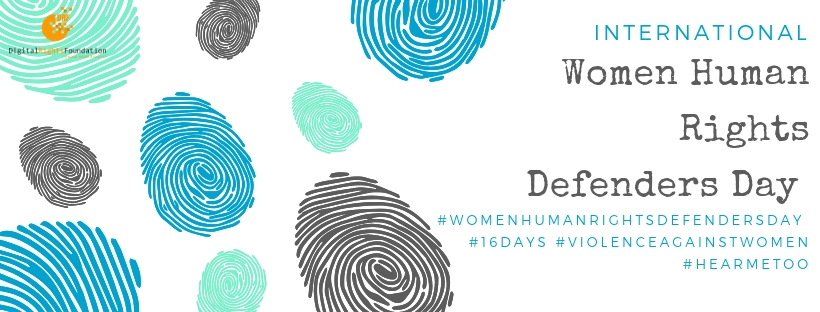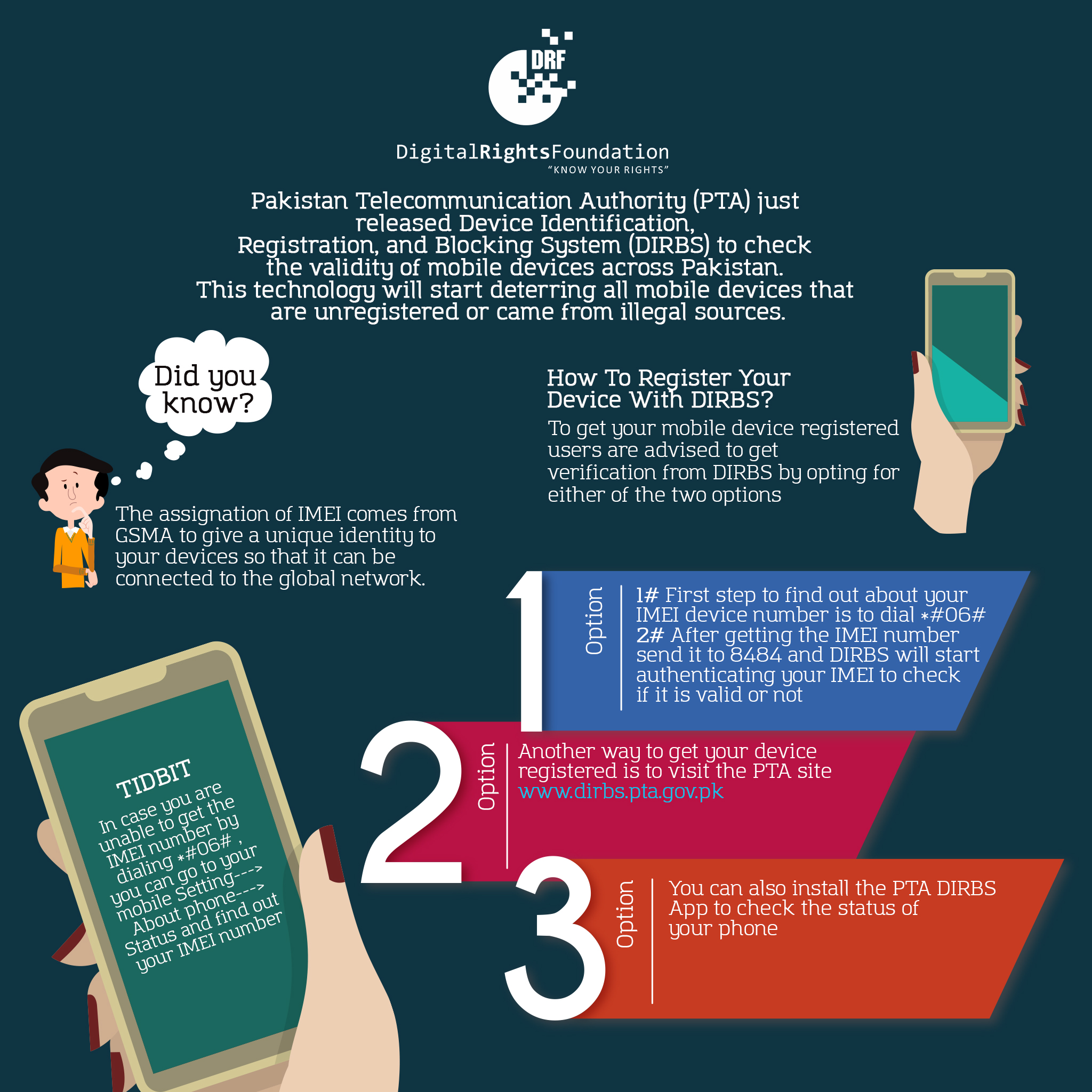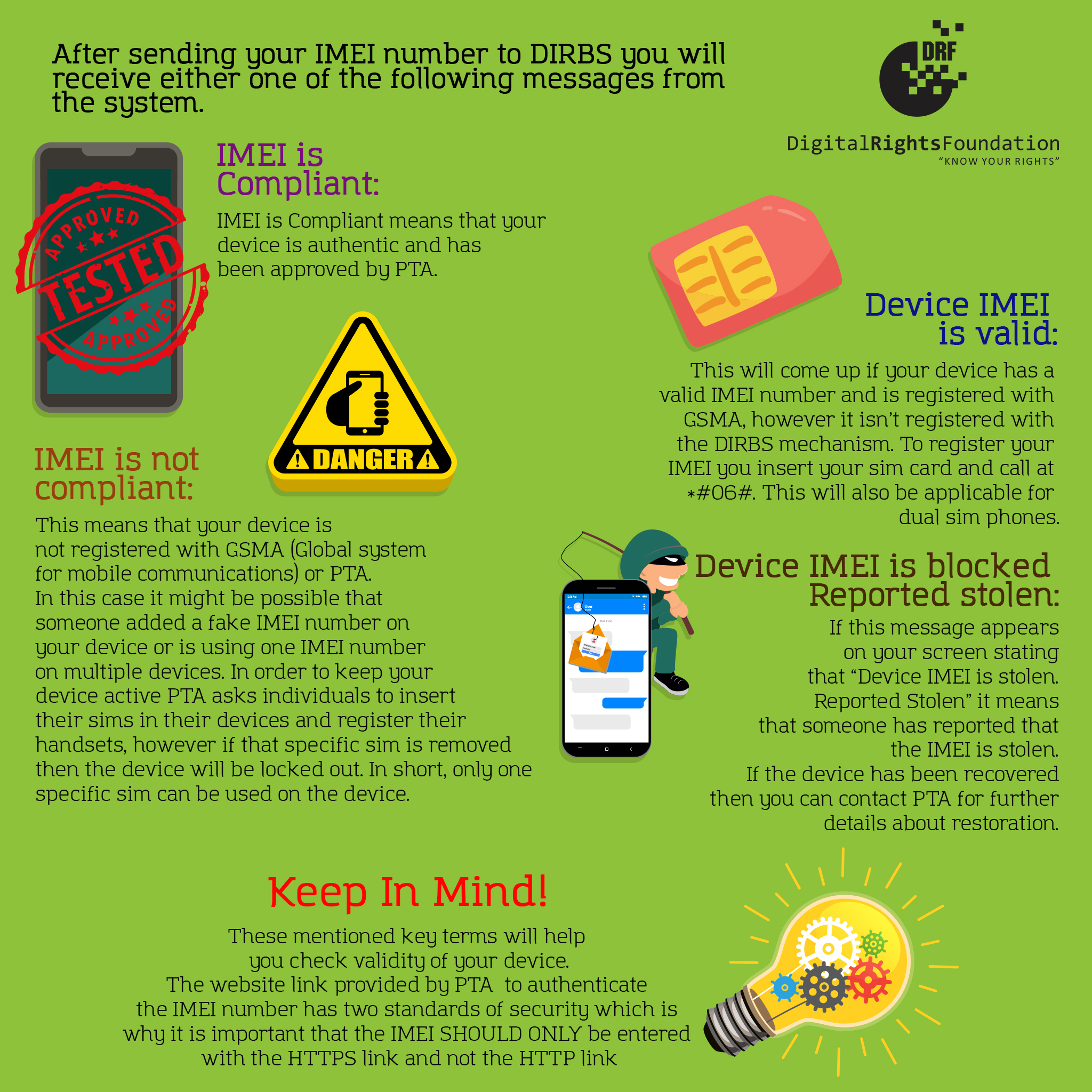 Digital Rights Foundation (DRF) launched the 16 Days of Activism campaign on the 25th of November which focused on gender based violence across the globe. The campaign focused on the theme of gender based violence at the workplace this year and DRF collaborated with the Network of Women Journalists for Digital Rights who shared their experiences and challenges from the field of journalism. The 16 Days of Activism also marked the International Day of Women Human Rights Defenders, held on 29th November. On this day DRF shared an infographic on the violence faced by women human rights defenders in Pakistan. Blogs were also shared during the 16 Days to emphasize the importance of taking measures to tackle violence against women in all fields. Click here to view more posts regarding the 16 Days campaign.
Digital Rights Foundation (DRF) launched the 16 Days of Activism campaign on the 25th of November which focused on gender based violence across the globe. The campaign focused on the theme of gender based violence at the workplace this year and DRF collaborated with the Network of Women Journalists for Digital Rights who shared their experiences and challenges from the field of journalism. The 16 Days of Activism also marked the International Day of Women Human Rights Defenders, held on 29th November. On this day DRF shared an infographic on the violence faced by women human rights defenders in Pakistan. Blogs were also shared during the 16 Days to emphasize the importance of taking measures to tackle violence against women in all fields. Click here to view more posts regarding the 16 Days campaign.
Internet Governance Forum 2018, Paris

Panel held on November 12 in Paris
DRF took part in the Internet Governance Forum 2018 (IGF) in Paris, France to represent Pakistan at the UN’s foremost multi-stakeholder conference. The conference, from November 12 to 14, saw DRF’s Shmyla Khan speak on the panel “Media and Content”. The conference also saw important discussions on topics such as fake news, freedom of expression online and gender in online spaces - and DRF ensured that the perspective from South Asia, and the Global South in general, was represented.
Click here to view the panel on Media and Content.
Nighat Dad represented Pakistan at Paris Peace Forum
The International Declaration on Information and Democracy was signed by different heads of States at the Paris Peace Forum held in November. The Executive Director of DRF, Nighat Dad, who is a member of the Information and Democracy Commission, contributed in the Declaration, especially in the Principle related to Right to Privacy. The 6-page document sets out democratic guarantees for the freedom, independence, pluralism, and reliability of information at a time when the public space has been globalized, digitalized and destabilized.
Click here to read the Declaration.

2nd International Youth Summit 2018, University Of Lahore

The panel discussion took place on November 28 in Lahore
DRF participated in a panel discussion on “Cross cultural communication” at 2nd International Youth Summit 2018, University Of Lahore. The panel consisted of Hajer Chiha Sassi (Ministry of Cultural Affairs, Tunisia), Romina Khursheed Alam (Member of National Assembly, Pakistan), Todd Shea (CEO and founder of Comprehensive Disaster Response Services), Islam Wazir (academic and analyst) and Shmyla Khan (representing DRF). The audience had delegates from across the world and DRF spoke about the role the internet can play in bridging cultural barriers.
DRF represented at the event ‘Ethical and Criminal Aspects of Digital Media’ at Kinnaird College Lahore


DRF's Executive Director, Nighat Dad, was invited as the keynote speaker at Kinnaird's Media Event on the 7th of November.
Ms. Dad highlighted the need for greater online security measures that can be taken by each and every one of us at an individual level for our personal security and also spoke about the kind of toll that cyber harassment can have on our youth. The Media Society had opened the event with a short play they had prepared on the impact of blackmail and revenge porn and Ms. Dad also spent a part of her speech focusing on imparting confidence and the message of help being around them in terms of the cyber harassment helpline and also spoke about the 'Ab Aur Nahin' project that will help to link victims of sexual harassment at workplace with a consortium of pro bono layers.
Freedom on the Net Report, 2018
Freedom House released the Freedom on the Net (FoTN) report for the year 2018, titled “The Rise of Digital Authoritarianism” globally. The report primarily focused on developments that occurred between June 2017 and May 2018. The report found that, out of the 65 countries assessed in Freedom on the Net, 26 experienced a deterioration in internet freedom and almost half of all declines were related to elections. The Pakistan report was authored by Digital Rights Foundation, and it was found that Pakistan remained marked as “Not Free” for the coverage period.
Nighat Dad attends The Global Future Council on Human Rights and Technology by World Economic Forum
Nighat Dad attended the council meeting which focussed on leveraging technology for human rights promotion and advocacy, and brought together academics, business leaders, and civil society to identify ways to strengthen responsible use of data and promote evidence-based policy-making. Members of the network meet each year at the Annual Meeting of the Global Future Councils in Dubai, and virtually, several times a year. They also develop recommendations and integrate their findings into World Economic Forum activities such as the Annual Meeting in Davos-Klosters and regional and industry events, as well as global decision-making processes.
DRF at A World of Tomorrow - Reimagined, Karachi
‘A World of Tomorrow - Reimagined’, a part of the School of Tomorrow (SOT) Events was a two-day conference held on 3rd and 4th November. Nighat Dad, along with Sharmeen Obaid-Chinoy and an educationist, Dr Lawrence Burke, set the direction for the event. Ms. Dad was part of two panels - ‘Navigating Global Surveillance Societies’ and ‘#MeToo and Beyond’. The two-day event had more than 100 national and international experts, policymakers, influencers, celebrities, social activists, environmentalists and thinkers from 15 countries sharing their ideas, perspectives and unique insights.

National Privacy Conference, Islamabad
DRF, along with it’s partners Privacy International and Friedrich Naumann Foundation for Freedom - Pakistan, organized the National Privacy Conference on ‘Data Protection and the Intersection between Gender and Privacy’ in Islamabad on November 19th, 2018.
The conference aimed to generate a comprehensive and interactive discussion with relevant stakeholders on data protection and the right to privacy in Pakistan. International and national trends and developments with regard to digital rights, data protection and gender and privacy were discussed at the event, which was attended by participants from across Pakistan.
The conference covered the themes of data protection and gender and privacy on the internet within the Pakistani context through panel discussions. The first panel, titled “Legal Framework of Data Protection in Pakistan”, was moderated by Sana Farrukh, and it shed light on the importance of having a data protection bill in the country. The panelists included, Nighat Dad, Executive Director of Digital Rights Foundation, Shehryar Hydri from P@sha, Ameena Sohail from Ministry of Information Technology and Telecom (MoITT), Atif Mumtaz from Punjab Information Technology Board (PITB) and Maleeha Mengal from AGHS.
The second panel, titled “Gender and Privacy”, addressed the gendered nature of the right to privacy. The panel, moderated by Shmyla Khan, brought together diverse perspectives on the variations as well as overlap of the gendered nature of the privacy discourse within Pakistan. Women and sexual minorities have different privacy concerns and experience social surveillance from the society, as well as the state, which makes them all the more vulnerable. The panelists discussed the areas of concern and developments that are needed among different stakeholders in order to account for the gendered aspect of privacy rights. The panelists included Amber Shamsi, an award-winning multimedia journalist hosting a show at Hum News, Farieha Aziz of Bolo Bhi, Mehlab Jameel of NAZ Pakistan and Seerat Khan of DRF.

Writers Retreat held in Islamabad
DRF, along with it’s partners Privacy International and Friedrich Naumann Foundation for Freedom - Pakistan, organized the Writers’ Retreat for Journalists held in Islamabad, on November 19th, 2018.
The main aim of the event was to learn from the joint experiences of journalists working in print media, and to work on strategies to combat their difficulties together. A select group of journalists from across Pakistan came together to discuss the risks and hurdles associated with their work, the mental health concerns that arise due to the same, and coping methods and strategies they currently employ and can use in the future.
Additionally, the Journalist Safety and Protection Bill was discussed, with the journalists giving their recommendations on the same, which we aim to present to the ministry of information.

DRF at Q Berlin Questions 2018


Nighat Dad was invited as a speaker at Q Berlin Questions 2018. The city hosted a broad scientific and scholarly debate with speakers from a range of countries and sectors. The event comprised of speeches, discussions and music and was attended by around 400 participants.
Click here to view the speech.
Istanbul Innovation Days 2018
The Istanbul Innovation Days (IID), organised this year in partnership with Dark Matter Laboratories of London, brought together internal and external partners to showcase methodologies and practical examples of innovative governance and peacebuilding practices in different countries and settings. DRF was asked to present its work and reflect on the experiments engaged in over the conference and their applications to it work and policy and governance.
Sana Farrukh, research associate at DRF, was a panelist on the closing panel, “Reflections on the future of Governance and Peacebuilding” alongside Hossein Derakhshan, Research fellow at Harvard Kennedy School’s Shorenstein Center, Martin Gramatikov, Director Measuring Justice, HiiL, Jonathan Cohen, Executive Director, Conciliation Resources, Shakirat Toktosunova, Country Representative International Alert, Kyrgyzstan, and Leif Kalev, Professor of State and Citizenship Theory, School of Governance, Law and Society, Tallinn University.

DRF at FNF’s 60 Year Celebrations


DRF along with its partners Friedrich Naumann Foundation for Freedom (FNF) celebrated Liberal footprints - Contributions to Pakistan's advancement : 60 Year Celebrations of FNF at Islamabad on 20th November. DRF set up the digital security clinic at the event where more than 300 people visited to discuss their personal digital security and the current legislation on digital rights in Pakistan in detail. The stall was visited by the German ambassador Martin Kobler and the Federal Minister of Education and National Heritage Shafqat Mehmood as well.
Nighat Dad gives an interview to BBC Urdu regarding fake news
While talking to BBC Urdu Nighat Dad talked about fake news and how this is an issue not just in Pakistan but all around the world. She mentioned that media houses and journalists should take responsibility to report fake news content found online to the social media companies and on the Government’s twitter handle so that the spread of misinformation could be controlled. She also emphasized that this is a global issue and raising awareness and education regarding fake news is very important.
Click here to view the full video.
National Youth Peace Conference ,2018

DRF delivered a talk on Reducing Inequalities at National Youth Peace Conference held on 27-28 November, Lahore. The panel consisted of Yasmin Rashid (Provincial Minister of Punjab), Shazia Butt (Member of Provincial Assembly, Pakistan), Abida Ali (Youth Activist), Risham Waseem (Maati Tv), Kami Sid (transgender activist) and Jannat Fazal (representing DRF). The audience had delegates from across the world and DRF spoke about the role the internet can play in bridging cultural barriers.
Workshop on online safety with Hum News in Islamabad
On 9th November 2018, DRF conducted a one-day workshop with the staff of Hum News in Islamabad. The workshop was part of DRF’s initiative of conducting online safety training with media houses considering the increasing importance of cyber security, particularly for media organisations, whose most valuable assets are their content. Effective tools and protocols were discussed to safeguard the highly sensitive information of media houses and maintain its privacy.

Virtual session on “How to Combat Gender based Violence in a digital world”, Karachi
DRF delivered a session virtually on cyber harassment and gender based violence in digital world at lincoln corner Karachi on November 29. The session was attended by students of different colleges.
‘Ethics for Social Media’ at Human Rights and Democracy Conference with Workers Education and Research Organization (WERO) and International Union of Food Workers (IUF)
DRF was part of a panel discussion on ‘Ethics for Social Media’ at the Human Rights and Democracy Conference on 29th November. The conference was with trade union representatives from Agriculture Culture, Sugar Mills, Hotels, Food and Beverage Industries.
Workshop on online safety for DAWN in Karachi

On 12th November 2018, DRF conducted a two-day workshop with DAWN in Karachi. The workshop focused on raising awareness regarding digital rights and equipping the staff of DAWN to employ effective tools and methods to keep themselves secure while performing their duties on digital platforms. The workshop was part of DRF’s initiative of conducting online safety trainings with media houses considering the increasing importance of cyber security, particularly for media organisations, whose most valuable assets are their content. Effective tools and protocols were discussed to safeguard the highly sensitive information of media houses and maintain its privacy.
“Online Safe Spaces for Journalists” at University of Sindh, Jamshoro
DRF held a session at University of Sindh with the students of Media and Communication studies on November 13, 2018. Around 80 students attended the awareness raising session where they were encouraged to keep themselves secure online.

Workshop for Lawyers on Digital Rights in Karachi
On 14th November 2018, DRF conducted a workshop which was held for lawyers in Karachi, focussing on creating awareness regarding digital rights and the legal landscape that governs digital rights. Around 20 lawyers attended the closed session and the participants were given specifically designed toolkits to guide them on how they can make online spaces safe for themselves, by adopting various tools and resources available to them.

Workshop for Journalists on Digital Rights, Karachi

On November 15th 2018, DRF conducted a workshop for journalists in Karachi. Journalists from other parts of Sindh also joined the session. The workshop consisted of an awareness raising session on digital rights and the legal landscape that governs digital platforms for freedom of media and journalists. The participants were also given hands-on training and specifically designed toolkits to guide them on how they can make online spaces safe for themselves by adopting various tools and resources available to them.
Nighat Dad meets the Human Rights Minister and the Federal IT Minister
Ms. Dad held a meeting with the Human Rights Minister, Shireen Mazari, and raised concerns regarding the human rights violations taking place in the online spaces. She also reiterated that human rights in the online spaces should be treated with the same severity as the violations that take place in the offline spaces. She also pushed for speedy trial in the Qandeel Baloch case. Later in the day Ms. Dad also met with the Federal IT Minister, Khalid Maqbool Siddiqui. She presented DRF’s recommendations on data protection law, tackling cyber harassment, internet shutdowns, digital gender divide, journalist safety and protection bill and online censorship. She also suggested him to make an advisory committee, with equal number of women in it, to help ministry achieve its goals.

Meeting with Shireen Mazari, the Human Rights Minister

Meeting with Khalid Maqbool Siddiqui, the Federal IT Minister
Nighat Dad appointed as the member of the International Advisory Committee for the joint SDG programme
Netherlands Organization for Scientific Research appointed DRF’s Executive Director, Nighat Dad, as a member of the International Advisory Committee (IAC) for the joint SDG programme. IAC is responsible for assessing the overall quality of the research proposals, advising the Programme Committee on funding of research projects and approving project evaluation reports, once they are reviewed and assessed by the IAC.
DRF at Warsaw Dialogue for Democracy 2018
DRF participated in the two-day conference held on 22nd and 23rd November. The Warsaw Dialogue for Democracy was held in Poland’s capital for the seventh time. This year’s edition focused on the potential and challenges emerging from a growing role of new technologies at today’s political scene. Experts from across the world put the spotlight on the influence of new media on the processes of democratization and human rights respect. The speakers put an emphasis on the very popular social media, specifically in the context of fake news and free elections. The conference also looked at the growing role of new communication tools.
Members of Network of Women Journalists for Digital Rights continued to pen articles and blogs

Members of DRF's Network of Women Journalists for Digital Rights continued to share articles and blogs on digital rights issues which can be found on the Hamara Internet website here. The Network advocates for women and other minority groups to have safe access to online platforms, where they can exercise their constitutional right of free speech without facing constant threats. The Network members pen articles to document these threats, bring forward issues in the implementation of legislation to prevent and protect women journalists from gender-based discrimination and sexual harassment both online and offline, and also advocate their access to effective remedies.































